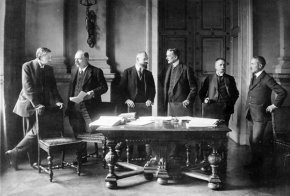Difference between revisions of "The Treaty of Versailles"
(Created page with " Following the end of World War I, The Treaty of Versailles required that Kaiser Wilhelm II be placed on trial for a "supreme offense against international morality and the sa...") |
|||
| Line 1: | Line 1: | ||
| + | |||
| + | [[File:Versailles.jpg|400x200px|framed|left]] | ||
Following the end of World War I, The Treaty of Versailles required that Kaiser Wilhelm II be placed on trial for a "supreme offense against international morality and the sanctity of treaties". | Following the end of World War I, The Treaty of Versailles required that Kaiser Wilhelm II be placed on trial for a "supreme offense against international morality and the sanctity of treaties". | ||
Revision as of 14:09, 24 March 2014
Following the end of World War I, The Treaty of Versailles required that Kaiser Wilhelm II be placed on trial for a "supreme offense against international morality and the sanctity of treaties". The Treaty of Versailles was the first time nations seriously considered bringing criminal charges on heads of state for contraventions of fundamental human rights. During the Paris Peace Conference, other treaties emphasised minority rights, including the rights to life and to liberty, freedom of religion, the right to nationality of the state of residence, complete equality with other nationals of the same state, and the ability to exercise civil and political rights.
